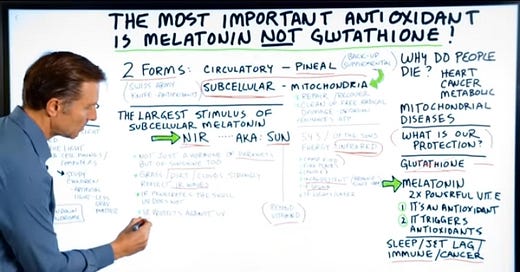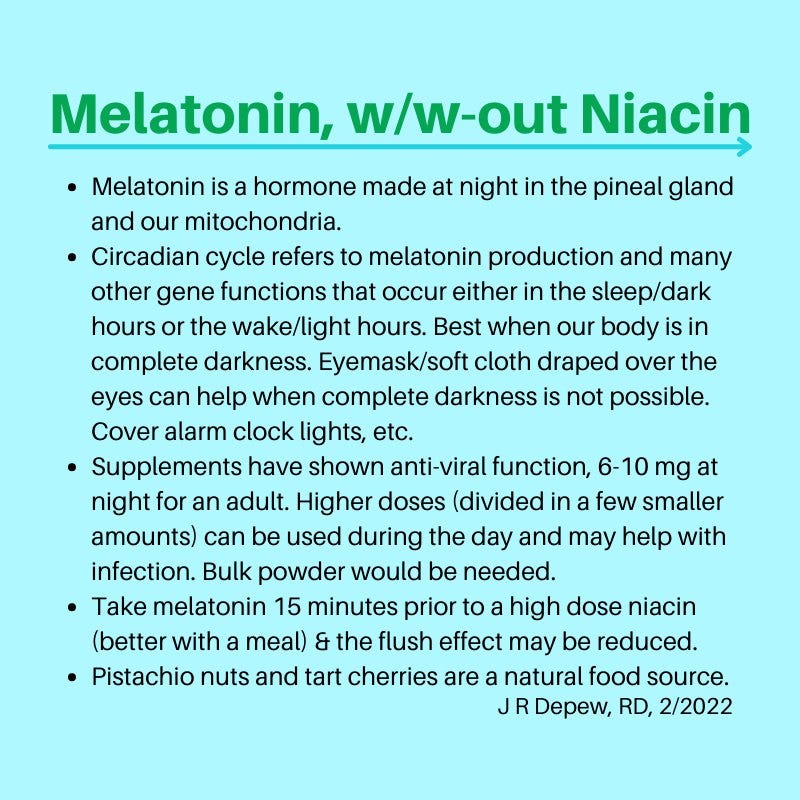Melatonin, more important antioxidant than glutathione - Dr. Eric Berg, DC.
Divided doses throughout the day can help health and possibly behavior in Alzheimer's or other dementia patients.
Dr. Berg summarizes a new paper about melatonin production in mitochondria - promoted by sunlight or infrared heat. Pineal gland melatonin is a backup, last resort when low, and is promoted by darkness.
More sunshine or infrared heat could help sleep at night and mood and mitochondrial health during the day. Blackout dark night and avoiding screen lights in tge last three hours before sleep also helps.
The Most Powerful Antioxidant is Melatonin not Glutathione. Dr. Eric Berg, DC.
Circadian Cycle health requires blackout dark night and full spectrum.light during the day, and it seems infrared heat sources can work too.
Link via a reply by Vinny, thanks!
Very high doses were safely used for CoV treatment, like 600 mg per day but taken five times, ~ 120 mg every ~ 5 hours. A review article by Reiter, et al., ‘Melatonin: highlighting its use as a potential treatment for SARS-CoV-2 infection’, includes the 600 mg study. (Reiter, et al., 2022)
Excerpt:
“The wide variety of melatonin doses proposed in these trials is much like the already-published reports on the use of melatonin to treat COVID-infected adults (Table (Table2).2). In these reports the amounts of melatonin given fall between 3 and 600 mg daily. Whereas all the studies reported positive outcomes when melatonin was used, none observed any toxicity of melatonin, including at the highest doses employed. In the report of a network analysis of drugs potentially useful in treating COVID, melatonin was suggested as the one to have the greatest likelihood of controlling SARS-CoV-2 infections [11]. The dose of melatonin that may be effective would possibly vary according to the age of the infected patient, since in aged individuals melatonin levels are often greatly diminished [106, 107].” (Reiter, et al., 2022)
Disclaimer: This information is being shared for educational purposes within the guidelines of Fair Use and is not intended to provide individual health guidance.
Reference List
(Reiter, et al., 2022) Reiter RJ, Sharma R, Simko F, Dominguez-Rodriguez A, Tesarik J, Neel RL, Slominski AT, Kleszczynski K, Martin-Gimenez VM, Manucha W, Cardinali DP. Melatonin: highlighting its use as a potential treatment for SARS-CoV-2 infection. Cell Mol Life Sci. 2022 Feb 20;79(3):143. doi: 10.1007/s00018-021-04102-3. PMID: 35187603; PMCID: PMC8858600. https://www.ncbi.nlm.nih.gov/pmc/articles/PMC8858600/







YES! From Mercola, via my file on melatonin: >>Oral supplemental melatonin, however, CAN enter your cells and mitochondria. This is a detail I was wrong about before, and which Reiter clarifes in this interview: “If you supplement with melatonin, it can also enter cells and get into the mitochondria as well. And that is also very important ... As you age, mitochondrial melatonin diminishes. If you supplement with melatonin, it will get into your mitochondria and, in fact, do what melatonin does — neutralize free radicals and protect the mitochondria's function.” https://www.scribd.com/podcast/584901737/What-You-Need-to-Know-About-Melatonin-Discussion-Between-Dr-Russel-Reiter-Dr-Mercola-In-this-interview-Russel-Reiter-Ph-D-a-world-class-ex Thanks Jen!
We have to remember that even in winter there's about 42% of sunlight is in the infrared spectrum, and this is what helps us produce subcellular melatonin. Incredible. Why I always make sure to get at least a 40 min walk outside first thing, no matter how cold or crappy it's out.
I wrote about IR light's mechanism on our metabolism here: https://open.substack.com/pub/romanshapoval/p/the-sun-we-cant-see?r=1iykap&utm_campaign=post&utm_medium=web